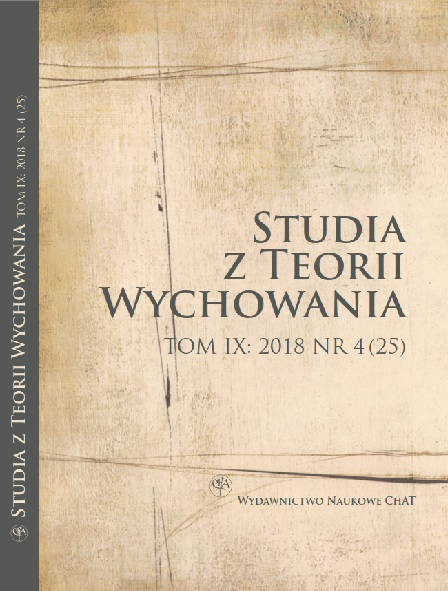Doświadczenie rodzicielstwa w warunkach transkulturowych – wyniki badań metodą IPA (Londyn)
Parental experience in the transcultural context – IPA’s research findings (London)
Author(s): Andrzej Pankalla, Aleksandra KilianSubject(s): Social Sciences, Education, Psychology, Sociology
Published by: Wydawnictwo Naukowe ChAT
Keywords: psychescapes; transculturality; parental experience; IPA; real psychology
Summary/Abstract: The article treats about the family and parental experience in the transcultural context and applicates the wider standpoint presented in the book "Psychescapes. Identity of our times?” (Pankalla, Kilian, 2007) which introduces into the specificity of the psycho-cultural perspective and signalises the need for developing psychological theory and practice that adequately consider and investigate relations between subjective worlds of unique individual experiences, multidimensional context and rich cultural resources. Contemporary man experiences the diversity of cultural narratives, complexity of patterns and lifestyles among which he moves, interprets and creates himself, relationships with others and the world. Cultural sciences, including our perspective of psychescapes identity, describe modern times as characterised by temporariness, flash, accidentality and multilogic. Special attention is dedicated to work by WolfgandWelsch – his conception of transculturalism and idea of transversal subject. The theoretic foundation to research families’ transcultural experience is established on the basis of Welsch’s project. The aim of the research project was to elicit and grasp the meaning of the studied experience as well as propose a new conceptual framework for the purpose of discussion and further examination in the psychological studies. The research project was conducted in London in 2010 using a qualitative research method Interpretative Phenomenological Analysis (IPA) which adequately describes personal, subjective and lived individual experience. Moreover, IPA is recognised for its openness towards complexity, originality and processuality of studied phenomena. The value of presented psycho-cultural perspective and conducted research appears to be significant when uncommonness of experience of becoming a transcultural family transpire to be an everyday experience and the source of real, specific and tangible experiences in the contemporary, polysemic and polyphonic world. Artykuł traktuje o doświadczeniu rodziny i rodzicielstwa w warunkach transkulturowych oraz aplikuje szerszą perspektywę zaprezentowaną w książce pt.: „Psychescapes. Tożsamość naszych czasów?” (2007) Andrzeja Pankalli i Aleksandry Kilian, która wprowadza w specyfikę autorskiej perspektywy psycho-kulturowej oraz sygnalizuje potrzebę budowania teorii i praktyki psychologicznej adekwatnie traktujących związki pomiędzy subiektywnymi światami unikalnych doświadczeń jednostkowych a wieloaspektowym kontekstem i bogatymi treściami kulturowymi. Człowiek współczesny doświadcza różnorodności kulturowych narracji, złożoności wzorów i stylów życia, wśród których porusza się, interpretuje i tworzy siebie, relacje z innymi i światem. Nauki o kulturze, w tym nasza perspektywa tożsamości psychescapes, opisują współczesne czasy jako charakteryzujące się przejściowością, migotliwością, akcydentalnością i multilogicznością. Szczególną uwagę zwracamy na myśli Wolfganga Welscha – jego koncepcję transkulturowości i typ podmiotu transwersalnego. Projekt Welscha stał się podstawą teoretyczną do badania doświadczenia transkulturowego w rodzinie. Celem projektu było uchwycenie znaczenia badanego doświadczenia i zaproponowanie nowej konceptualnej perspektywy, w ramach której będzie ono omówione i interpretowane. Badania były przeprowadzone w Londynie w 2010 roku metodą jakościową IPA, która adekwatnie opisuje osobiste, subiektywne i przeżyte doświadczenia jednostkowe. Ponadto, IPA jest metodą otwartą na złożoność, oryginalność i procesualność badanych fenomenów. Wartość zaprezentowanej perspektywy psycho-kulturowej oraz przeprowadzonych badań wydaje się być znacząca, gdy niecodzienność doświadczenia stawania się transkulturową rodziną okazuje się codziennością i źródłem realnych, konkretnych i namacalnych przeżyć we współczesnym polisemicznym i polifonicznym świecie.
Journal: Studia z Teorii Wychowania
- Issue Year: IX/2018
- Issue No: 4 (25)
- Page Range: 119-136
- Page Count: 18
- Language: Polish

